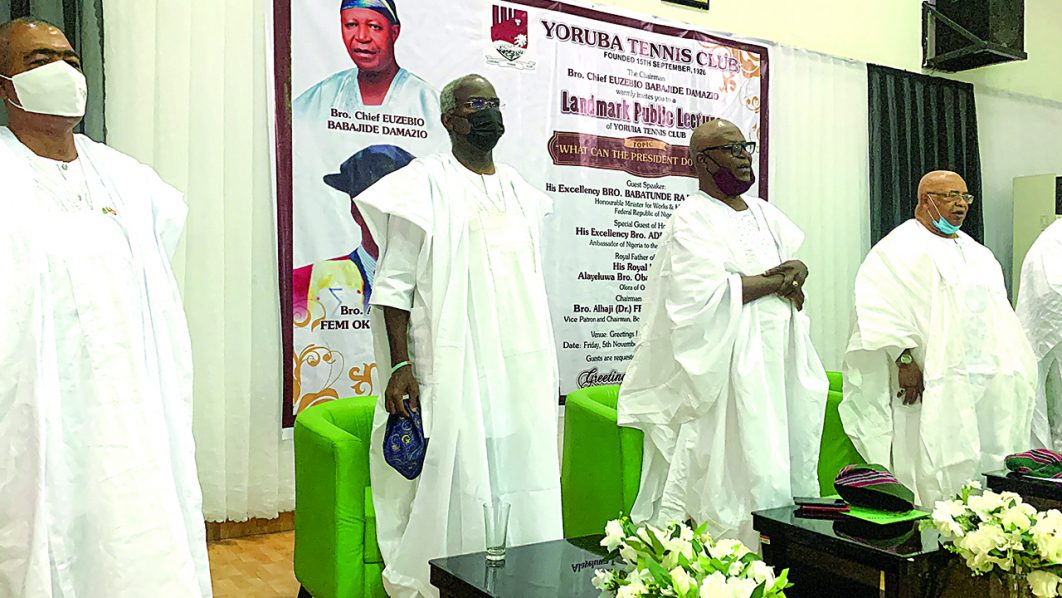
Minister of Works and Housing, Babatunde Raji Fashola has said Nigerians are not fully aware of the role of each of the three tiers of government and they expect the President to do everything.
The former Governor of Lagos State, who was the guest speaker at the Yoruba Tennis Club public lecture, with the theme, ‘What can the President do for me?, said Nigerians must learn to channel some of their demands to their local council chairmen and state governors.
In his words: “Some say the office of the Vice President is just a spare tyre, but the statement is not factual, and that the VP has no power of his own is a lack of knowledge of the constitution.
Fashola who faulted the assertion that the Nigerian President is the most powerful President in the world stressed: “if you go through the constitution, you will find out that the office of the president is referred to 48 times. 23 instances refer to the power the President can exercise, nine of those powers are subject to the National Assembly, four instances refers to powers exercised by the president subject to other institutions, nine instances refer to the President function and duty, three instances refers to restrictions on the power of the President so, how is Nigerian President the most powerful in the world? So, some are conflicting the power of the president with the function of the President which is misleading.
He added: “Some youths demanded during the EndSARS protest that the president should sack the IGP, but I educated them that the president has no such power and that the only power he has in that regard is to give lawful direction.
“Of all the President we have had, Nigerians never loved any one of them while in office, we seem to love them after they have left or died, why is that so, to me, the answer is lack of depth in interaction.
“Nigerians are not sufficiently familiar with the constitution and the role of which offices are expected to play. It seems to me that we are expecting the right thing from the wrong place. I can’t ask the chairman of the Yoruba Tennis Club to do for me the responsibility of the secretary of the club.
“I carried out a research and what Nigerians expectations are and they I discovered the major issues are in security, education, healthcare, transportation, water supply, employment, housing and electricity. Do they approximate to the function of the president?
“So, in understanding what the president can do, we must bear in mind the nature of our political arrangement. The president as the head of the country leads the executive arm of the federal government but that federal government is made up of two other arms. Power is shared between the Chairman of the local government and the state governor on the executive side. On the legislative side power is shared between the senators, House of Representatives members. Primary Education and Primary healthcare are not functions of the federal government, they are the duty of the local government.
“It is the people of Nigeria, rather than one man who truly have the power and responsibility for our affairs so, let’s talk about electricity. In 2013, the Federal Government privatized its own side of the electricity so, what is happening at the state level on electricity should not be directed to the President because it’s the responsibility of the governor of the states, also ask the state house of Assembly what they plan to do about it because they have the power to make the law for generation, transmission and distribution. It’s also the responsibility of the state that we have water.”
Speaking on security, Fashola said Section 14 (2)(b), which stipulates that the security and the welfare of the people shall be the primary purpose of government, states that both the local government, state and federal government can do this. “But every one of us has the responsibility when it comes to security, but many of us are talking about right without looking at section 24 that talks about duty as citizens. The best thing is to prevent conflicts as citizens, to make sure that conflicts don’t last long.
Speaking on road networks in the country, the Minister said: “The three levels of government have the responsibility for each type of road, the federal government has the responsibility to federal trunk roads in the constitution and it’s in item 11 in the exclusive list. Interstate road is the responsibility of the federal government. There are 200,000 national road networks but the federal government roads account for only 35,000, which is 17 percent, the remaining are states and local governments roads. So, the largest belongs to the local governments.
On the Lagos-Ibadan expressway, the road will be completed in June 2022.
On housing, he said: “if we want to build more houses, we have to look more to the state because the state controls the land, not the federal government, the lands the FG has today were given by the state.
“Those who are more vulnerable, who suffers inequalities are people who have to pay rent. In a society where we are asking people who receive their pay at the end of the month in areas to go and bring three years rent in advance is not the best. Rent should be lower to three or six months or one day, they will pay in arrears; it happens in other places, those places we love, places we want to be like.
On his part, Chairman, Yoruba Tennis Club, Chief Euzebio Babajide Damazio, said: “The minister made us understand that power is a division of labour among the tiers of government. As a club, we organise activities like this to let people know that it’s not about social activities, we also have civic activities.
He added: “most of the things we do here help in the formulation of policies and implementation.”



